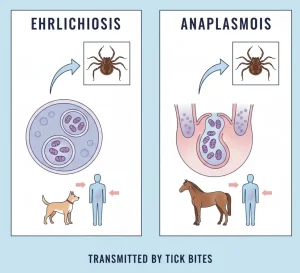Overview
Diagnosis
Diagnosing tick-borne infections such as ehrlichiosis or anaplasmosis can be challenging because their symptoms closely resemble those of many other illnesses. A clear history of a tick bite or potential exposure to tick-infested areas is often a key clue in reaching a diagnosis.
Your healthcare provider will typically perform:
-
A physical examination to look for signs of infection and tick exposure.
-
Blood tests to detect specific abnormalities and confirm infection.
Common findings in blood tests for these infections include:
-
Low white blood cell count, which indicates a reduced immune defense.
-
Low platelet count, which can affect blood clotting.
-
Elevated liver enzymes, suggesting possible liver involvement or inflammation.
In addition, specialized blood tests can help identify the infection by detecting:
-
Specific bacterial genes unique to the disease-causing organism.
-
Antibodies produced by the immune system in response to the infection.
Treatment
If ehrlichiosis or anaplasmosis is confirmed — or even strongly suspected — treatment should begin immediately to prevent serious complications.
Antibiotic therapy
-
The primary treatment is doxycycline (Doryx, Vibramycin, others).
-
It is continued for at least three days after the fever subsides and symptoms begin to improve.
-
The total course usually lasts five to seven days, but severe infections may need two to three weeks of treatment.
Alternative treatment
-
For individuals who are pregnant or allergic to doxycycline, the antibiotic rifampin (Rifadin, Rimactane, others) may be prescribed as an alternative.
Early treatment is essential, as it can greatly reduce the risk of complications and speed up recovery.
Advertisement

